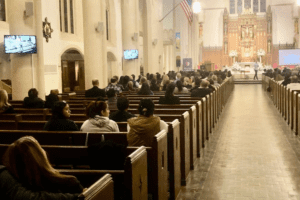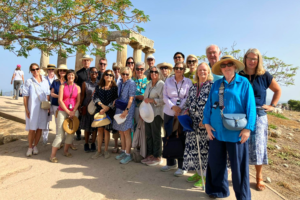“Transformation“
Naples, Florida. I’m here resting for the weekend after a hectic week for work and mission out west, and an even more eventful week up north awaiting me. One of the questions I got in Houston that has been a cause for a lot of meditation since was, “How does the mission convert a ‘Sunday morning Catholic’ to an ‘all in disciple of Jesus’?” As I’ve tossed this around in my head, I keep coming back to the “Faith, Hope, and Love” blog we re-posted just a few weeks ago. And what I’ve concluded is that while we all enter a mission with a healthy store of “Faith, Hope, and Love”, that store is replenished and deepened through mission. Indeed, in the process of helping the Lord saves souls for eternity, we ourselves are transformed, made new.
1. A deeper belief. Most of us approach our faith as an inheritance of sorts, one we don’t really question much and assume is always there. In my case, before I became a missionary, it meant getting to church on Sunday mornings and following the rules as best I could. The idea of doing a street mission in NYC struck me, as readers of The Missionary of Wall Street know, as a particularly bad idea, and one I frankly was very fearful about. Yet, over time, as the Lord seemed to deliver one little miracle after another out on the streets, I and the other missionaries were gradually transformed from casual believers to something much deeper, much more convicted. We began to believe that whatever the situation, however harsh or uninviting, that if the Lord helped us, something good would happen. Our minds were transformed to a deeper belief in God and what is possible with Him. Our faith grew, and became firmer. Unshakeable? That’s the goal, but even today, for me faith is a process, not an end point. I’d rather say, “Deeper. More convicted. More daring. More fearless.” It’s this faith that we will tap into on Wednesday as we head out into the streets. It will be cold. People will be in a hurry. And yet, we know the Lord will make something very beautiful happen if we persevere joyfully. And those of us who secretly harbor the suspicion that He won’t, will walk home that night knowing that, once again, He did it. Our faith will be just a little stronger for the experience.
2. An eye on the eternal. Another aspect of being Catholic is our hope in the resurrection, of our eternal place in heaven after our time on earth has passed. For me, born Catholic and taught the Catechism for First Holy Communion and Confirmation, this eye to heaven was simply something I never argued about, though for sure it was very distant to me, not very tangible, and in many ways, less important than the more pressing worldly matters at hand every day. On mission, the sense of distance between here and eternity shortens considerably. Out there on the streets, too often the missionary is confronted with matters of spiritual life and death, souls sliding down the wrong slope, confused, upset, even in despair. Many of these souls often believe that they are unforgiveable, and as one said last September during the San Genaro Mission, that “I’m going down there forever. There’s no hope for me.” Before becoming involved in the mission, my sense of the eternal was frankly distant, vague, and hardly front and center in my life. All of that changed the day I met Rich in 2012, and confronted a soul on the edge of a dark eternity. Most of the SoHo missionaries have had a similar experience, and it has transformed their vision of present and future. It has made our hope in the eternal, in heaven, stronger and more vivid. It’s this hope in the eternal that we will tap into on Wednesday. Sometime during the afternoon or evening, perhaps just one soul—maybe more – on the brink of a dark eternity will come our way, and we will convey our hope to her. We will bring her back to God for reconciliation with Him in the sacrament. And when she comes out of that confessional, glowing, our own hope in the future will be deepened.
3. Our brothers and sisters are out there. The third great Christian virtue is Love, and we all know Jesus’ command to “Love our neighbor as ourselves.” But what does this really mean? It seems more an ideal, a kind of “best practices if you can do it but not terribly practical.” But out on the streets, the more and more people of every stripe, color, and belief we encounter, this notion of universal brotherhood becomes much more real. After 15 minutes with a previously perfect stranger on a busy city street, as they unburden their soul to you, their brotherhood with you, through Christ, takes on new meaning, new life. In fact, the missionary is touched by that soul, cries for him, yearns to bring him home, hopes for their eternal future. The missionary is willing to endure cold, discomfort, abuse for that soul. The missionary has learned to love.
Come join us on Wednesday. Bring what you have in the tank on Faith, Hope and Love. I promise you will leave with a deeper reservoir of each. You will be transformed.
A missionary





